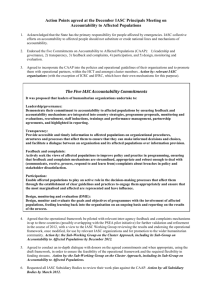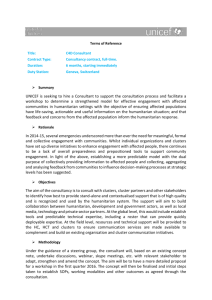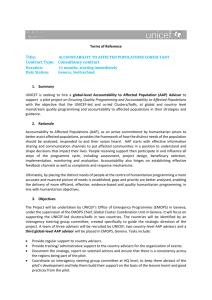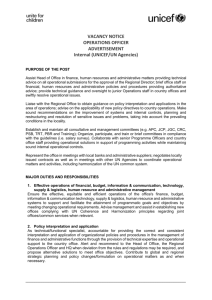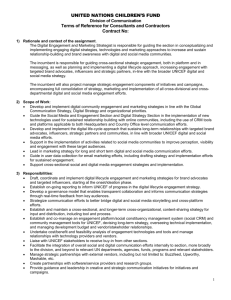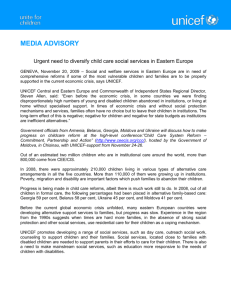Terms of Reference
advertisement
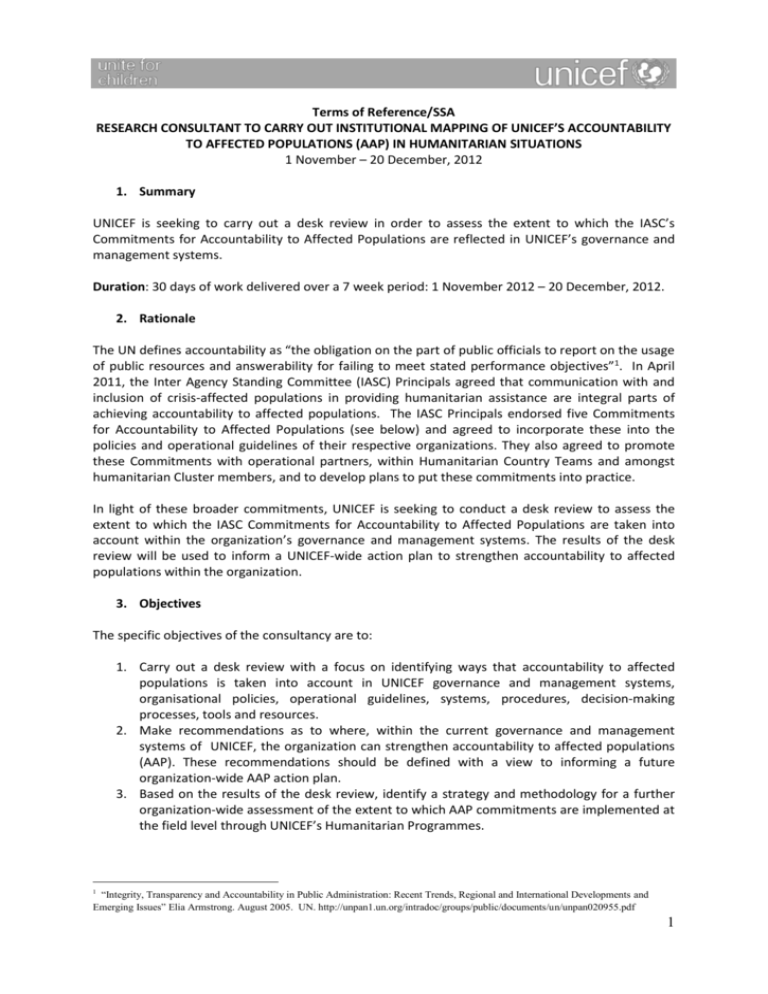
Terms of Reference/SSA RESEARCH CONSULTANT TO CARRY OUT INSTITUTIONAL MAPPING OF UNICEF’S ACCOUNTABILITY TO AFFECTED POPULATIONS (AAP) IN HUMANITARIAN SITUATIONS 1 November – 20 December, 2012 1. Summary UNICEF is seeking to carry out a desk review in order to assess the extent to which the IASC’s Commitments for Accountability to Affected Populations are reflected in UNICEF’s governance and management systems. Duration: 30 days of work delivered over a 7 week period: 1 November 2012 – 20 December, 2012. 2. Rationale The UN defines accountability as “the obligation on the part of public officials to report on the usage of public resources and answerability for failing to meet stated performance objectives”1. In April 2011, the Inter Agency Standing Committee (IASC) Principals agreed that communication with and inclusion of crisis-affected populations in providing humanitarian assistance are integral parts of achieving accountability to affected populations. The IASC Principals endorsed five Commitments for Accountability to Affected Populations (see below) and agreed to incorporate these into the policies and operational guidelines of their respective organizations. They also agreed to promote these Commitments with operational partners, within Humanitarian Country Teams and amongst humanitarian Cluster members, and to develop plans to put these commitments into practice. In light of these broader commitments, UNICEF is seeking to conduct a desk review to assess the extent to which the IASC Commitments for Accountability to Affected Populations are taken into account within the organization’s governance and management systems. The results of the desk review will be used to inform a UNICEF-wide action plan to strengthen accountability to affected populations within the organization. 3. Objectives The specific objectives of the consultancy are to: 1. Carry out a desk review with a focus on identifying ways that accountability to affected populations is taken into account in UNICEF governance and management systems, organisational policies, operational guidelines, systems, procedures, decision-making processes, tools and resources. 2. Make recommendations as to where, within the current governance and management systems of UNICEF, the organization can strengthen accountability to affected populations (AAP). These recommendations should be defined with a view to informing a future organization-wide AAP action plan. 3. Based on the results of the desk review, identify a strategy and methodology for a further organization-wide assessment of the extent to which AAP commitments are implemented at the field level through UNICEF’s Humanitarian Programmes. “Integrity, Transparency and Accountability in Public Administration: Recent Trends, Regional and International Developments and Emerging Issues” Elia Armstrong. August 2005. UN. http://unpan1.un.org/intradoc/groups/public/documents/un/unpan020955.pdf 1 1 The assessment will be carried out against the five commitments identified by the IASC with detailed indicators outlined for each. These include: 1. Leadership/governance: ensuring feedback and accountability mechanisms are integrated into country strategies, programme proposals, monitoring and evaluations, recruitment, staff inductions, trainings and performance management, partnership agreements, and highlighted in reporting. 2. Transparency / Information sharing: providing accessible and timely information to affected populations on organizational procedures, structures and processes that affect them to ensure that they can make informed decisions and choices, and facilitate a dialogue between an organization and its affected populations over information provision. 3. Feedback and Complaints: Actively seeking the views of affected populations to improve policy and practice in programming, ensuring that feedback and complaints mechanisms are streamlined, appropriate and robust enough to deal with (communicate, receive, process, respond to and learn from) complaints about breaches in policy and stakeholder dissatisfaction. 4. Participation: Enabling affected populations to play an active role in the decision-making processes that affect them through the establishment of clear guidelines and practices to engage them appropriately and ensure that the most marginalized and affected are represented and have influence. 5. Design, monitoring and evaluation: Designing, monitoring and evaluating the goals and objectives of programmes with the involvement of affected populations, feeding learning back into the organisation on an on-going basis and reporting on the results of the process. The organisation learns from experience to continually improve its performance The consultant will be expected to adapt the CAAP Analysis and Self-Assessment Tool developed by the IASC sub-working group on AAP to use as a basis for the review,2 with detailed questions to be explored in the assessment developed in consultation with UNICEF. 4. Methodology The methodology for the assessment will include a desk review of relevant IASC documents as well as a UNICEF organization-wide assessment of key documents at HQ, regional and country office levels working to support programmes in humanitarian and/or fragile settings. The consultant will have access to UNICEF’s intranet and materials for the synthesis. Periodic progress updates will be provided by the consultant to UNICEF. The consultant will benefit from some preliminary materials to be provided by UNICEF including background materials, the draft CAAP Analysis and Self-Assessment Tool and list of key informants. A Steering Group, comprised of focal points representing different departments and sections within UNICEF, will be established to provide oversight to the desk review, and to help identify relevant documents and focal points, as well as review the recommendations of the review. 5. Deliverables 1. A draft work plan outlining timeline, refined CAAP Analysis Self-Assessment Tool, list of key resources and contact persons, and refinement of assessment questions (week 1); 2 CAAP Analysis and Self-Assessment Tool, FAO V3:15/05/12 2 2. A draft inception report outlining results of the desk review and preliminary list of recommendations (week 4 - 5); 3. A final assessment report with detailed recommendations for strengthening AAP within governance and management systems, as well as a detailed methodology for carrying a review of field based implementation (week 7). 6. Timeline. 30 days of full time work carried out over a 7 week period. Final report will be due 20 December 2012. 7. Supervision. The consultant will be supervised on a daily basis by the Policy Specialist, Humanitarian Policy Section, EMOPS, and the project will be overseen by the Chief of the Humanitarian Policy Section, EMOPS. 8. Duty Station The consultant will work out of UNICEF NYC. 9. Qualifications or specialized knowledge/ experience required Proven understanding of and professional experience working on issues related to accountability to affected populations. Over 10 years of progressively responsible professional work experience in applied social science research with a focus on humanitarian and/or international assistance. Excellent writing, conceptual and analytical skills including the ability to present complex processes and issues clearly to a heterogeneous audience and in an actionable manner. Demonstrated professional research and writing experience, including through publications. Advanced university degree in Social Sciences or a related technical field. Knowledge of UNICEF programming on in humanitarian and fragile settings preferred. 10. Deadline for Submissions Interested candidates are requested to submit (1) a letter of interest, outlining your relevant background and experience, (2) an updated P11 form, and (3) 2 writing samples to Steven Rossi at email: srossi@unicef.org by Sunday 28 October, 2012. 3
